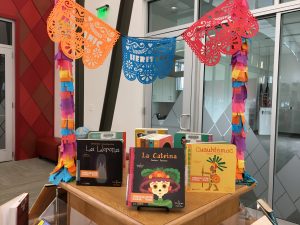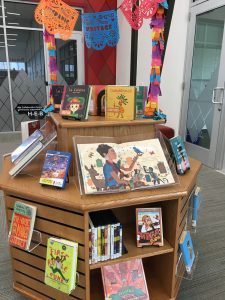In honor of Hispanic Heritage month (9/15-10/15), I created a book display at my library to honor and celebrate a sampling of the many iconic Hispanic figures, ranging from artists like Frida Kahlo to activists like Emma Tenayuca and Cesar Chavez. In particular I wanted to highlight the Lil’ Libros book collection, which is a series of bilingual board books, each starring a different Latin American historical figure. These colorful picture books teach fundamental concepts such as numbers, colors, and shapes, translating the text in both English and Spanish. Board books are meant for babies and toddlers so that a love of learning can be instilled at the earliest age. My heart soared when I discovered this little book series because it was a wonderful representation of mi cultura y tradiciones.


The Lil’ Libro series was created by Patty Rodriguez and Arianna Stein, two pioneering Latinas who were tired of not seeing themselves represented in the books they read to their babies. The series was created with the goal of “starting the bilingual learning journey with subjects that parents feel a connection with.” The resulting book series includes subjects such as La Llorona, the weeping woman known throughout Mexican folklore, Cantinflas, an iconic Mexican comedic film actor, and 12 other Latin American figures.
In my personal journey I’ve come to realize just how important it is for individuals to feel they have a representation of themselves, their culture and their heritage in their everyday lives. I recently attended the Joint Conference of Librarians of Color in Albuquerque, New Mexico. I was fortunate to meet an extremely diverse group of library professionals from all over the country. One workshop I attended was called “Beyond the Racial Stalemate.” During this workshop, the participants and facilitators sat in a racial healing circle. I listened as these men and women relayed stories of oppression and racial injustice they had experienced throughout their lives and professional career. It was deeply saddening but also empowering to hear how they had overcome those injustices and continue to fight prejudice in their everyday lives. A recurring theme that I came across throughout the conference was the question of why Hispanics and other minority groups do not visit libraries. The answer is that they do not see a representation of themselves within their local library. This lack of representation can take many forms — there are no Spanish speakers to make them feel more comfortable in their native tongue, the collections do not represent their needs and interests, or simply because there are no staff members or patrons who look like them. I grew up in San Antonio, surrounded by my large, loving Mexican American family and in many ways, I inhabited a protective bubble. It was not until I attended the University of Texas at Austin that I truly felt like a minority. I lacked representation of my race and culture and it was an uncomfortable feeling. I personally knew a handful of Hispanic students who left school because they missed home and the comfort it offered. Thankfully I was able to persevere and graduate, but I’ve been in those shoes and I want to help others not to feel this way.
Libraries can become more welcoming spaces for latinx by hiring a diverse workforce and Spanish speakers. Libraries can also build up their bilingual collections and forge connections with latinx community leaders and gatekeepers. The Los Angeles County Public Library has gone one step further and created the iCount Initiative in an effort to remove barriers to equity for all communities. Library Equity Action Plans (LEAPs) are targeted to specific communities, such as latinx families or LGBTQ teens. Action plans include targeted training about how best to serve these communities and allocating resources to improve the overall library experience of the target groups.
As public historians, we have an obligation to empower cultural groups to tell their own stories. I believe we can achieve this by promoting active engagement in the past. This is one of the many reasons I love the Lil’ Libros book series. Patty Rodriguez and Arianna Stein incorporate Latin American culture into children’s books and in doing so help to make libraries a more welcoming space for Hispanic families by giving them representation. Because we all deserve to feel like our stories are worth being told. Historia para todos!
